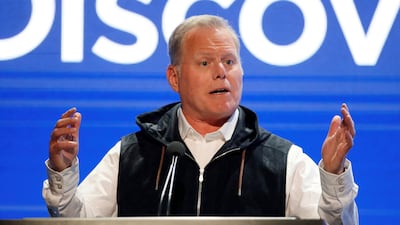WarnerMedia, a unit of US telecom company AT&T, finalised its merger with television conglomerate Discovery on Friday, forming one of America's largest mass media companies that is expected to set off a major shift in Hollywood and the entertainment industry.
The combined entity from the $43 billion deal will be known as Warner Bros Discovery and is set to pose a serious challenge to streaming mainstays including Netflix, Disney, Apple and Amazon. The company, which is projected to post revenue of about $54bn in 2023, will begin trading on the Nasdaq exchange on Monday under the ticker symbol "WBD".
"With our collective assets and diversified business model, Warner Bros Discovery offers the most differentiated and complete portfolio of content across film, television and streaming," said David Zaslav, chief executive of Warner Bros Discovery.
"We are confident that we can bring more choice to consumers around the globe while fostering creativity and creating value for shareholders," added Mr Zaslav, who has been in charge of Discovery for 15 years.
Warner Bros Discovery's portfolio now has some of the biggest names in the media industry, including Discovery Channel, Warner Bros Entertainment, CNN, HBO and Cartoon Network, and streaming services Discovery+ and HBO Max. It also controls big franchises including Batman, Harry Potter and Game of Thrones, as well as the NCAA's March Madness basketball tournament.
Analysts say that one of Mr Zaslav's top priorities is to make streaming video — one of the biggest and most ferociously-fought segments in entertainment — as profitable as the traditional TV business.
The size of the global video streaming market — which includes films, television shows and live-streamed content — is expected to reach $18.1 billion by 2027 at a compound annual growth rate of almost 16 per cent, forecasts by Research and Markets show.
Production companies are also pouncing on the opportunity, spending upwards of $10bn on making original content, said Kevin Westcott, an industry leader at London consultancy Deloitte.
chief executive of Warner Bros Discovery
AT&T first announced that it would spin off WarnerMedia in 2020. The finalised merger is expected to result in AT&T investing at "record" levels in 5G and fibre as it works to become the top broadband company in the US, its chief executive John Stankey said.
"At the same time, we’ll sharpen our focus on returns to shareholders. We expect to invest for growth, strengthen our balance sheet and reduce our debt, all while continuing to pay an attractive dividend that puts us among the top dividend paying stocks in America," he added.
Under terms of the agreement, at close AT&T received $40.4bn in cash and WarnerMedia’s retention of certain debt, with shareholders of AT&T receiving 0.241917 shares of WBD for each share of AT&T common stock they held at close, the companies said.
As a result, AT&T shareholders received 1.7 billion shares of WBD, representing 71 per cent of WBD shares on a fully-diluted basis.
Discovery’s existing shareholders own the remainder of the new company. In addition to their new shares of WBD common stock, AT&T shareholders continue to hold the same number of shares of AT&T common stock they held immediately before close.


